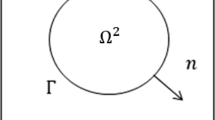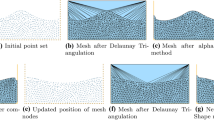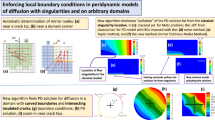Abstract
In this paper, a novel true meshless numerical technique – the Hermite–Cloud method, is developed. This method uses the Hermite interpolation theorem for the construction of the interpolation functions, and the point collocation technique for discretization of the partial differential equations. This technique is based on the classical reproducing kernel particle method except that a fixed reproducing kernel approximation is employed instead. As a true meshless technique, the present method constructs the Hermite-type interpolation functions to directly compute the approximate solutions of both the unknown functions and the first-order derivatives. The necessary auxiliary conditions are also constructed to generate a complete set of partial differential equations with mixed Dirichlet and Neumann boundary conditions. The point collocation technique is then used for discretization of the governing partial differential equations. Numerical results show that the computational accuracy of the Hermite–Cloud method at scattered discrete points in the domain is much refined not only for approximate solutions, but also for the first-order derivative of these solutions.
Similar content being viewed by others
Author information
Authors and Affiliations
Rights and permissions
About this article
Cite this article
Li, H., Ng, T., Cheng, J. et al. Hermite–Cloud: a novel true meshless method. Computational Mechanics 33, 30–41 (2003). https://doi.org/10.1007/s00466-003-0497-1
Received:
Accepted:
Published:
Issue Date:
DOI: https://doi.org/10.1007/s00466-003-0497-1




